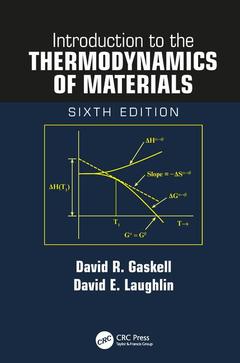Description
Introduction to the Thermodynamics of Materials (6th Ed.)
Authors: Gaskell David R., Laughlin David E.
Language: English
Subjects for Introduction to the Thermodynamics of Materials:
Keywords
Gibbs Free Energy; chemical thermodynamics; Molar Gibbs Free Energy; materials science and engineering; Ideal Gas; thermodynamics of polymers; Partial Molar Gibbs Free Energy; thermodynamics of ferroic materials; Standard Gibbs Free Energy Change; First Law of Thermodynamics; Constant Pressure Molar Heat Capacity; Second Law of Thermodynamics; Molar Enthalpy; Constant Volume Molar Heat Capacity; Gibbs Free Energy Curve; Excess Molar Gibbs Free Energy; Monatomic Ideal Gas; Free Energy Curves; Reversible Adiabatic Expansion; Partial Molar; Reversible Isothermal Expansion; Configurational Entropy; Molar Heat Capacity; Van Der Waals Equation; Rt Ln; Phase Diagram; Atm Pressure; Thermodynamic State Variable; Molar Volume; Van Der Waals Fluid; Constant Temperature Heat Reservoir
166.30 €
In Print (Delivery period: 15 days).
Add to cart· 15.6x23.4 cm · Hardback
Description
/li>Contents
/li>Biography
/li>
Maintaining the substance that made Introduction to the Thermodynamic of Materials a perennial best seller for decades, this Sixth Edition is updated to reflect the broadening field of materials science and engineering. The new edition is reorganized into three major sections to align the book for practical coursework, with the first (Thermodynamic Principles) and second (Phase Equilibria) sections aimed at use in a one semester undergraduate course. The third section (Reactions and Transformations) can be used in other courses of the curriculum that deal with oxidation, energy, and phase transformations. The book is updated to include the role of work terms other than PV work (e.g., magnetic work) along with their attendant aspects of entropy, Maxwell equations, and the role of such applied fields on phase diagrams. There is also an increased emphasis on the thermodynamics of phase transformations and the Sixth Edition features an entirely new chapter 15 that links specific thermodynamic applications to the study of phase transformations. The book also features more than 50 new end of chapter problems and more than 50 new figures.
Thermodynamic Principles. Introduction and Definition of Terms. The First Law of Thermodynamics. The Second Law of Thermodynamics. The Statistical Interpretation of Entropy. The Fundamental Equations and Their Relationships. Heat Capacity, Enthalpy, Entropy, and the Third Law of Thermodynamics. Phase Equilibria. Phase Equilibrium in a One-Component System. The Behavior of Gases. The Behavior of Solutions. Gibbs Free Energy Composition and Phase Diagrams of Binary Systems. Reactions and Transformations of Phases. Reactions Involving Gases. Reactions Involving Pure Condensed Phases and a Gaseous Phase. Reaction Equilibria in Systems Containing Components in Condensed Solution. Electrochemistry. Thermodynamics and Phase Transformations. Appendices. A. Selected Thermodynamic and Thermochemical Data. B. Exact Differential Equations. C. The Generation of Additional Thermodynamic Potentials as Legendre Transformations.
David R. Gaskell received a B.Sc. in Metallurgy and Technical Chemistry from the University of Glasgow and a Ph.D. from McMaster University. Dr. Gaskell’s first faculty position was at the University of Pennsylvania, Philadelphia, where he taught from 1967 to1982 in Metallurgy and Materials Science. He was recruited in 1982 to Purdue University at the rank of Professor where he taught until 2013. During Dr. Gaskell’s career he served as a Visiting Professor, National Research Council of Canada, Atlantic Regional Laboratory, in Halifax, Nova Scotia (1975-1976) and as a Visiting Professor, G.C. Williams Co-operative Research Centre for Extraction Metallurgy, in the Department of Chemical Engineering, University of Melbourne (1995). He also held a position during his sabbatical in Australia as a Visiting Scientist, Commonwealth Scientific and Industrial Research Organisation (CSIRO), in Clayton, Victoria. Dr. Gaskell authored the textbooks Introduction to Metallurgical Thermodynamics, Introduction to the Thermodynamics of Materials, and Introduction to Transport Phenomena in Materials Engineering.
David E. Laughlin is the ALCOA Professor of Physical Metallurgy in the Department of Materials Science and Engineering of CMU and also has a courtesy appointment on the Electrical and Computer Engineering Department. He was the Principal Editor of Metallurgical and Materials Transactions from 1987 to 2016. David is a graduate of Drexel University (1969) and the Massachusetts Institute of Technology (1973). He is a Fellow of TMS, an Honorary member of AIME, and a Fellow of ASM International. He is also the recipient of several CMU awards for teaching and research excellence and a Distinguished Scientist of the TMS Electronic, Magnetic & Photonic Materials Division. He has authored more than 400 technical publications in the field of phase transformations, physical metallurgy, and magnetic materials, and has edited o




